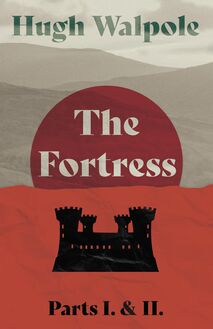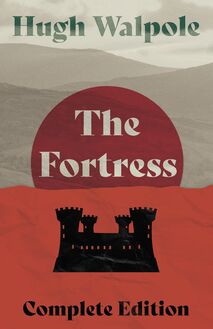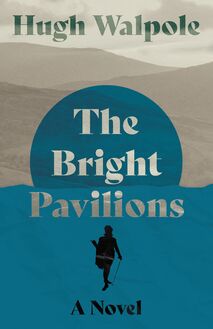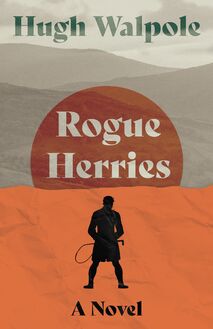-
 Univers
Univers
-
 Ebooks
Ebooks
-
 Livres audio
Livres audio
-
 Presse
Presse
-
 Podcasts
Podcasts
-
 BD
BD
-
 Documents
Documents
-
- Cours
- Révisions
- Ressources pédagogiques
- Sciences de l’éducation
- Manuels scolaires
- Langues
- Travaux de classe
- Annales de BEP
- Etudes supérieures
- Maternelle et primaire
- Fiches de lecture
- Orientation scolaire
- Méthodologie
- Corrigés de devoir
- Annales d’examens et concours
- Annales du bac
- Annales du brevet
- Rapports de stage
La lecture à portée de main
Vous pourrez modifier la taille du texte de cet ouvrage
Découvre YouScribe en t'inscrivant gratuitement
Je m'inscrisDécouvre YouScribe en t'inscrivant gratuitement
Je m'inscrisEn savoir plus
Vous pourrez modifier la taille du texte de cet ouvrage
En savoir plus

Description
The final instalment in Hugh Walpole’s tumultuous The Herries Chronicle, the family saga has entered the early twentieth century.
Judith Paris’ granddaughter, Vanessa, regales the passionate woman’s story, beginning with her hundredth birthday in the 1870s. The dramatic Lake District setting welcomes you back to the grand life of the Herries family. First published in 1933, Vanessa introduces new characters and tragic backstory to the period drama.
Proudly republished by Read & Co. Books, Vanessa is a must-read family saga for fans of historical novels.
Sujets
Informations
| Publié par | Read Books Ltd. |
| Date de parution | 24 août 2022 |
| Nombre de lectures | 0 |
| EAN13 | 9781528797849 |
| Langue | English |
| Poids de l'ouvrage | 1 Mo |
Informations légales : prix de location à la page 0,0500€. Cette information est donnée uniquement à titre indicatif conformément à la législation en vigueur.
Extrait
VANESSA
A NOVEL
By
HUGH WALPOLE
First published in 1933
Copyright © 2022 Read & Co. Classics
This edition is published by Read & Co. Classics, an imprint of Read & Co.
This book is copyright and may not be reproduced or copied in any way without the express permission of the publisher in writing.
British Library Cataloguing-in-Publication Data A catalogue record for this book is available from the British Library.
Read & Co. is part of Read Books Ltd. For more information visit www.readandcobooks.co.uk
FOR ERIK PALMSTIERNA IN FRIENDSHIP
Contents
Hugh Walpole
A PREF ATORY LETTER
PART I
THE RASCAL
THE HUNDRE DTH BIRTHDAY
FOUNTAIN AT THE ROADSIDE
HERRIES DRAWING-ROOM
THE SEASHORE
FALL OF THE HOU SE OF ULDALE
WILD NIGHT IN THE HILLS
INSIDE THE FORTRESS
THE DUCHESS OF WREXE’S BALL
PART II
THE HUSBAND
JUBILEE
THE FLITTING
VIOLET BELLAIRS IS PREVENTED
A JOURNAL AND SOME LETTERS
ELL IS IN PRISON
THE GREAT TIM OTHY SCANDAL
VANES SA IN PRISON
ESCAPE INTO DANGER
PART III
THE LOVER
HAPPINESS I N RAVENGLASS
THE KOPJE
YOUNG TOM IN NEWLANDS
STO RM COMING UP
PERFECT LOVE
TIMOTHY BELLAIRS PAYS SOME VISITS
WHIT E WITH SWANS
PART IV
THE GHOST
KALEIDOSCOPE
I. THE FLAME
KALEIDOSCOPE
II. TR IUMPHAL ARCH
S ALLY AND TOM
MEN AT WAR
BELO VED MOUNTAIN
F AMILY DINNER
COUNTRY FAIR
THE EAGLE
Hugh Walpole
Hugh Seymour Walpole was born in Auckland, New Zealand in 1884. He was educated at a series of boarding schools in England, followed by Emmanuel College, Cambridge. Walpole’s father hoped he would follow him into the clergy, but after three years as a missionary, in 1909, Walpole resolved to become a man of letters. His first commercial success came in 1911 with the novel Mr Perrin and Mr. Traill , after which Walpole made the acquaintance of writers such as Henry James and Joseph Conrad, and declared his ambition to become the greatest writer of his era. For the rest of his life, Walpole wrote prolifically. During the twenties he produced more than a novel a year, with The Cathedral (1922) and Wintersmoon (1928) proving to be great successes. In 1930, he began his most popular series of novels with the historical romance Rogue Herries , following it with Judith Paris (1931), The Fortress (1932) and Vanessa (1933). Eventually, he amassed an oeuvre of 36 novels, five volumes of short stories, two plays and three volumes of memoirs. He died in 1941, aged 57. Despite the fact that Walpole sold enormously well on both sides of the Atlantic, and was praised by many of his contemporaries, he is somewhat forgotten now, in part because he was overshadowed by P. G. Wodehouse and others.
A PREFATORY LETTER
My dear Erik,
I take the greatest pleasure in dedicating this final novel in the Herries series to yourself because during those last years our friendship has been one of the best thing s I possess.
With that pleasure I must contrast a very real sense of loss. I am, as I write the last lines of Vanessa , saying good-bye to work that has been, for the last six years, my constant preoccupation. It cannot interest my readers that Judith, Benjie, Vanessa and the others have appeared to me such real and constant friends, but now, as they vanish down the wind, I feel a true and personal loneliness.
But I should like to thank those readers who have also found them friends, and to urge upon one or two critics that long novels are no new thing, and have been always in the tradition of the En glish novel.
Yet more boldly I would say that in this present case these four Herries novels are intended to be read as one novel, and I hope that some day there will be a reader who will both live long enough and be idle enough to read them so? But one ambition of mine is, I find, already realised. Some of those who love and know Cumberland have found in these pages a tribute to that country which has p leased them.
Affectionately, Hugh Walpole
‘Therefore, like as May month flowereth and flourisheth in many gardens, so in like wise let every man of worship flourish his heart in this world, first unto God, and next unto the joy of them that he promised his faith unto; for there was never worshipful man nor worshipful woman, but they loved one better than another: and worship in arms may never be foiled, but first reserve the honour to God, and secondly the quarrel must come of thy lady: and such love I call vir tuous love.’
Sir T homas Malory
PART I
THE RASCAL
THE HUNDREDTH BIRTHDAY
At the sight of her son Judith’s eyes and mouth broke into the loveliest smile that any member of the Herries family, there present, had ever seen. It was Judith Paris’ hundredth birthday. The Family was making a P resentation.
Adam bent down and kissed her. Her tiny, trembling hand rested on the velvet collar of his coat, then lay against his cheek. Her triumph was complete; her exceeding happiness overflowed so that, laughing though she was, tears rolled down her cheeks.
* * * * *
Afterwards, at the luncheon downstairs, Adam was to make the speech, but when the time came, the one that he made was very feeble. Everyone (except of course Adam’s wife, Margaret, and Adam’s young daughter, Vanessa) agreed that he was no speaker; the speech of the occasion came, oddly enough, from Amery Herries, of whom no one had expected very much. There were more speeches at the dinner later in the day—Timothy, Barney Newmark, Carey Rockage, Captain Will Herries, all spoke—but it was Amery who was afterwar ds recalled.
‘Damned good speech, d’you remember?’ years later one Herries would say to another. ‘At old Madame’s Hundredth Birthday party up in Cumberland . . . Best speech ever I heard in my life.’
Adam was a failure. He never could say anything in public, even long ago in his Chartist days. More than that, he was thinking of his mother, the old lady upstairs, all the time. And more than that again, he couldn’t sound the right Herries note. He was only quarter Herries anyway, and he simply wasn’t able to think of them in the grand historical light that all the family, expectant round the luncheon tab le, desired.
But Amery could. He thought of them all (including himself) in precisely the g rand manner.
All Ad am said was:
‘I am sure we are all very happy to be here to-day for my mother’s hundredth birthday. You’ll forgive me, I know, if I don’t say very much. Not very good at expressing my feelings. Yes—well—I know what you’re all feeling. We’re all very proud of my mother and we all ought to be. She’s like the Queen—nothing can beat her. I don’t need to tell you how good she is. Of course I know that better than the rest of you—naturally I would. There’s no one like her anywhere. I ask you all to drink her health.’
And so they did—with the greatest enthusiasm. Nevertheless there was a feeling of disappointment, for he had said nothing about the Family—not a word. It was expected of him. After all, even though he was illegitimate, his father had been of Herries blood. They knew, they had always known, that Adam Paris failed at anything that he tried. What could you expect of a fellow who had once been a Chartist and approved of these Trades Unions, was always on the wrong side, against Disraeli, in favour of tiresome agitators like Mr. Plimsoll? (They disliked any and every agitator. They disapproved of agitation.)
But Amery made everything right again with his speech. He didn’t look his sixty-five years, so spare of figure and straight in the back; he had not run to seed like poor Garth, who led, it was feared, a most improvident and dissolute life. Amery’s speech was short but entirely t o the point:
‘Only a word. I won’t take more than a minute. But I do want to say that my friend Adam is quite right—this is a great occasion for all of us! There is not, I venture to say, another family in England with so remarkable a lady at the head of it as Madame whom we are gathered together to honour. It is not only that she has reached her hundredth year—although that is an achievement in itself—but that she has reached it with such vigour, such health, such courage! It is interesting to remember that nearly a hundred and fifty years ago her father, as a young man, rode pack-horse into this district, a stranger and almost you might say homeless. There were, I suppose, members of our family scattered about England at that time, but no one, I fear, had ever heard of any of them. Now, sitting round this table to-day we have one of England’s most famous novelists—spare your blushes, Barney Newmark—the widow of one of England’s most prominent financiers—I bow to you, Lady Herries—whose son is following worthily in his father’s footsteps—I drink to the City, Ellis—the son of one of England’s leading Divines, the gallant Captain here—one of the most active members, I’m told, of the House of Peers—never been there myself, but that’s what they tell me, Carey, my son—and one of the loveliest women in the whole of England, Mrs. Robert Forster—I bow towards yo u, Veronica!
‘I promised that I would be short, so I will not point out to you how unusual a family ours is. You know it already (loud and happily complacent laughter). We are a remarkable family. Why should we not say so? We have done, we are doing something for England. England, glorious England, Mistress of the World as she deserves to be.’ (He was going on to say something about foreigners but remembered just in time that Madame’s husband had been a Frenchman and that Adam had married a German.) ‘So here’s to Madame and here’s to England and here’s to the Herries family! May they all three live, prosper, and help the wo
-
 Univers
Univers
-
 Ebooks
Ebooks
-
 Livres audio
Livres audio
-
 Presse
Presse
-
 Podcasts
Podcasts
-
 BD
BD
-
 Documents
Documents
-
Jeunesse
-
Littérature
-
Ressources professionnelles
-
Santé et bien-être
-
Savoirs
-
Education
-
Loisirs et hobbies
-
Art, musique et cinéma
-
Actualité et débat de société
-
Jeunesse
-
Littérature
-
Ressources professionnelles
-
Santé et bien-être
-
Savoirs
-
Education
-
Loisirs et hobbies
-
Art, musique et cinéma
-
Actualité et débat de société
-
Actualités
-
Lifestyle
-
Presse jeunesse
-
Presse professionnelle
-
Pratique
-
Presse sportive
-
Presse internationale
-
Culture & Médias
-
Action et Aventures
-
Science-fiction et Fantasy
-
Société
-
Jeunesse
-
Littérature
-
Ressources professionnelles
-
Santé et bien-être
-
Savoirs
-
Education
-
Loisirs et hobbies
-
Art, musique et cinéma
-
Actualité et débat de société
- Cours
- Révisions
- Ressources pédagogiques
- Sciences de l’éducation
- Manuels scolaires
- Langues
- Travaux de classe
- Annales de BEP
- Etudes supérieures
- Maternelle et primaire
- Fiches de lecture
- Orientation scolaire
- Méthodologie
- Corrigés de devoir
- Annales d’examens et concours
- Annales du bac
- Annales du brevet
- Rapports de stage














